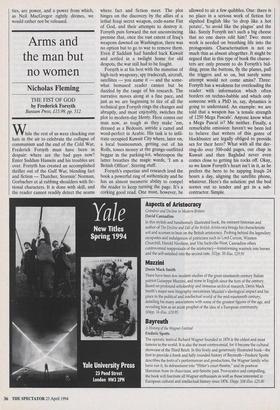Arms and the man but no women
Nicholas Fleming
THE FIST OF GOD by Frederick Forsyth Bantam Press, £15.99, pp. 512 While the rest of us were chucking our hats in the air to celebrate the collapse of communism and the end of the Cold War, Frederick Forsyth must have been in despair: where are the bad guys now? Enter Saddam Hussein and his troubles are over. Forsyth has created an accomplished thriller out of the Gulf War, blending fact and fiction — Thatcher, Stormin' Norman, Gorbachev et al rubbing shoulders with fic- tional characters. It is done with skill, and the reader cannot readily detect the seams where fact and fiction meet. The plot hinges on the discovery by the allies of a lethal Iraqi secret weapon, code-name Fist of God, and their attempts to destroy it. Forsyth puts forward the not unconvincing premise that, once the vast extent of Iraq's weapons dawned on Washington, there was no option but to go to war to remove them. Even if Saddam had handed back Kuwait and settled in a twilight home for old despots, the war still had to be fought.
Forsyth is at his best with the minutiae of high-tech weaponry, spy tradecraft, aircraft, satellites — you name it — and the some- what bemused reader cannot but be dazzled by the range of his research. The narrative moves along at a fine pace, and just as we are beginning to tire of all the technical gen Forsyth rings the changes and abruptly, and most enjoyably, switches the plot to modern-day Henty. Here comes our man now, as tough as they make 'em, dressed as a Bedouin, astride a camel and word-perfect in Arabic. His task is to infil- trate occupied Kuwait City where, later on, a local businessman, getting out of his Rolls, tosses money at the grunge-outfitted beggar in the parking-lot, whereupon the latter breathes the magic words, `I am a British Officer'. Stirring stuff.
Forsyth's expertise and research lend the book a powerful ring of authenticity and he has an almost mesmeric ability to compel the reader to keep turning the page. It's a corking good read. One must, however, be allowed to air a few quibbles. One: there is no place in a serious work of fiction for slipshod English like 'to drop like a hot potato', 'to avoid like the plague' and the like. Surely Forsyth isn't such a big cheese that no one dares edit him? Two: more work is needed on breathing life into the protagonists. Characterisation is not so much thin as absent altogether. It might be argued that in this type of book the charac- ters are only present to do Forsyth's bid- ding, press the buttons, fly the planes, pull the triggers and so on, but surely some attempt would not come amiss? Three: Forsyth has a weakness for overloading the reader with information which often borders on techno-babble and which only someone with a PhD in, say, dynamics is going to understand. An example: we are told that a weapon has 'a tensile strength of 1250 Mega Pascals'. Anyone know what a Mega Pascal is? Me neither. Finally, a remarkable omission: haven't we been led to believe that writers of this genre of blockbuster are legally obliged to provide sex for their hero? What with all the der- ring-do over 500-odd pages, our chap in Kuwait and then Baghdad never even comes close to getting his rocks off. Okay, so we know Forsyth's heart isn't in it, as he prefers the hero to be zapping Iraqis 24 hours a day, aligning the satellite phone, whatever. Here's the solution: put the bed scenes out to tender and get in a sub- contractor. Simple.


























































 Previous page
Previous page